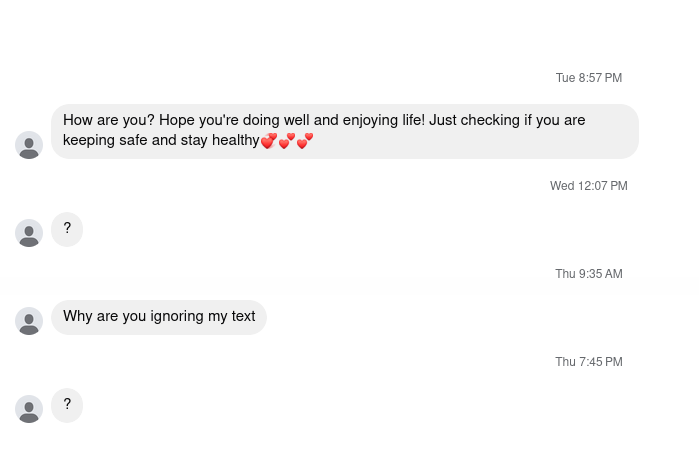I will never forget the day Nora told me what was really going on. When we first started coaching together, the person I’ll call Nora had thousands of emails maxing out her inbox. She was getting close to 400 incoming emails a day!
Nora knew that this mountain of email clutter was holding her back from the peaceful life she wanted. But digging out, deleting, and unsubscribing was hard for her. It meant facing up to false guilt, which is hard for all of us helper-types.
Have you ever had the thought that you just can’t delete emails, “just in case” you need them to be of service to others? Ever expected yourself to keep tons of resources, because someone else might find them useful?
If so, then you know that this feeling of over-responsibility covers a deeper fear of worthlessness. For Nora, that fear ran deep.
And as she sifted through the deluge of email, she noticed something important. An old friend of hers, who we’ll call Christy, had sent her a LOT of emails.
Christy had a hard life, and wasn’t well; Nora felt sorry for her. So instead of Nora noticing how awful she felt around her “friend,” she worked harder. She gave advice and tried to help.
When that didn’t work, Nora said no to more correspondence. But Christy refused to take no for an answer, and the emails kept coming.
Let’s pause for a PSA from Dr. Martha Stout of Harvard: “If you find yourself often pitying someone who consistently hurts you or other people, and who actively campaigns for your sympathy, the chances are close to 100 percent that you are dealing with a sociopath.”
Nora didn’t know to watch out for the pity play; most people don’t. And the correspondence had spiraled out of control. Christy had sent her 358 emails in the past year!
When Nora told me that, I asked her, “How many of those emails did you want to receive?”
“None,” she answered.
And while Nora’s so-called friend was an extreme case, I’ve encountered my own version of this dynamic. For example, recently I signed into Facebook and noticed that I had several messages from a new “friend.” Keep in mind, this was someone I’d never met or encountered before.
After I’d accepted her friend request a couple of days before, she’d sent a series of four messages over the course of about 48 hours.

Clearly, I did not meet her expectations! While I consider not checking Facebook on a daily basis completely reasonable and right for me, not being in constant contact read as unreasonable to her.
My present self understands that a sense of entitlement is a huge red flag. In the past, however, I might have felt false guilt arise, and wondered if I’d done something wrong.
In coaching, Nora also reckoned with false guilt about Christy. She sifted through the trauma-driven beliefs that had kept her in this awful dynamic. Together, Nora and I questioned beliefs such as …
I’m responsible for her unhappiness.
I’m the last person who can help her.
It’s mean to want her out of my life.
We also got to the underlying core issue (which was not what Nora thought it was), and did emotional-level work to resolve it. After that, it was relatively easy for her to set a firm boundary and block Christy. What a relief!
As soon as Nora ended it, she looked more alive. When she told me, “I have to take care of me first,” I raised my arms and cheered.
And get this. Almost the moment Nora said goodbye for good, a new love came into her life. Interestingly, it was someone else from way back when! But this time, the feelings were mutual.
In my experience, that’s how it works. Good things are always trying to come to us, but old drama is blocking the path. And when we finally clear the way, goodness rushes in.
Can you relate to this, dear reader? Have you ever stayed in an unhealthy relationship (or a job, or another commitment) because of false guilt? Are you in one now? If so, how much time, money, and energy have you spent on self denial?
When you really count the cost, it’s staggering. But the truth can free you to say, “Enough is enough, starting now.”
What causes false guilt?
Let’s get clear on what false guilt is in the first place. It has nothing to with harming other people, or violating our own values. That’s “real guilt” territory.
False guilt is a different animal. It’s an internal game of ping-pong, in which we go back and forth about whether or not we have the right to lead our own lives.
I like how Christel Nani talks about guilt in her book Sacred Choices:
“What most people call guilt is the uncomfortable feeling that results from the battle between what one is supposed to do and what one wants to do.”
False guilt is the ongoing vacillation between, “I’m supposed to do this, but I want to do that.”
But it goes farther back than that, doesn’t it? Because we feel bad for wanting what we want. At some point, we got the message that who we are and what we want is not okay.
Just as what causes perfectionism is fancied-up fear, what causes false guilt is hidden shame.
Why do I feel guilty for no reason?
Well, dear reader, you don’t. There’s always a reason. When you have a persistent sense of false guilt, there’s always an origin story. There was always a moment when you were “subscribed” to a sense of shame.
For example, in my first book, You Don’t Owe Anyone, I wrote about a time when I struggled to spend $11 on Christmas ornaments. At the checkout I was gripped by misplaced guilt and shame, because in the cultic church of childhood I’d been taught that Christmas decorations were somehow sinful and bad.
If you feel guilty at the slightest possible infraction, then know this: there’s nothing wrong with you. The false guilt is a survival mechanism and a trauma adaptation. It had an important role to play in your life. It kept you safe in times past.
And – it does not get to dictate your future.
What helped me was recognizing this simple truth: If I was going to feel guilty no matter what I did, then I might as well go ahead and make some positive changes! I might as well go ahead and set healthy boundaries and take good care of myself.
How to deal with false guilt
The first step is simply to notice: When do I feel it?
If your internal “guilt gauge” is overly responsive, then you’re going to feel a real guilt onslaught when you start setting healthy boundaries and taking better care of yourself.
As Dr. Gabor Maté wrote in When the Body Says No:
“For many people, guilt is a signal that they have chosen to do something for themselves. . . . ‘I feel guilty?’ [one] could say. ‘Wonderful. Hallelujah! It means I must have done something right, acted on my own behalf for a change.’”
When you’ve found an example of false guilt, ask yourself: What rules am I living by? What are the shoulds, oughts, and musts that dictate my days? Write them down.
Once you have those rules in front of you, take them through a questioning process. I recommend and coach people through The Work of Byron Katie; I go into detail about it in You Don’t Owe Anyone.
Question the beliefs that are keeping you stuck and scared. From there, you open up a space to imagine what else is possible.
Start imagining what’s possible by asking yourself these two questions:
- What would I do if no one would be mad at me, and everyone approved?
- What would I do if I didn’t need more approval from anyone – if my approval tank was already filled to the brim?
Take a moment. What would you do differently?
Here are just a few answers I’ve heard from my coaching clients:
- Go get the mail in my bathrobe
- Cut my hair super short
- Tell my mother she needs to ask first before coming over
- Move across the country and live in a tiny house
- Get divorced (and ask for what I want in the settlement)
- Quit my job and start my own business
What would change about your life, if you didn’t need approval? If you gave yourself permission to look at what you want and go for it? There would be lots of positive changes on the path to your purpose.
Important note: You do not actually have to make the changes at this point! You just need to be honest about what those desired changes are. If you’re scared to feel more guilt right now, that’s OK.
You don’t have to do anything before you’re ready. You are allowed to go gently with this process. (My favorite guideline for inner work comes from a therapist quoted in Anne Lamott’s novel Blue Shoe: “Go only as fast as the slowest part of you [can] go.”)
If you are afraid to feel the guilty feelings, practice being kind to the parts of you that are afraid. If a part of you is afraid to go gently because darn it, you need to change now! . . . then be kind to that part too.
Frequently Asked Questions about False Guilt
For those of you who are preparing to take action, I can hear you asking: But how am I supposed to do the things on my list, knowing I’ll face push back and pressure? How do I handle that one person who is probably going to lose their mind?
The short answer is: You build a sturdy home within yourself, so that you can weather the storms that come your way. You can’t change their response, but you can change your capacity to handle it.
In order to build that psychological structure, you need relational support. Ideally, you’ll work with a therapist and/or a coach to support you in the process of recovering your true self…the one who’s currently buried under the weight of expectations.
This is especially important if there’s something or someone in your life that’s not good for you, that you know that you need to let go of – but you just keep clinging on tightly.
Dear reader, pause here and ask yourself: Is there anything I’m holding on to that I know isn’t right for me? Do I feel I can’t let go, yet I don’t know why?
If so, I know what that’s like. There was a friendship that I just could not let go of, even though it wasn’t good for me, and hadn’t been good for a long time. In this video, I share the story, and the emotional-level work that helped me heal and move on.
Emotional-level tools and processes like the one I describe in the video free you to start living authentically and building your confidence.
Did you know that confidence literally means, “fidelity to self”? If you don’t have that, the pressure from other people is going to win. You’re going to second-guess and go back on your word.
Fortunately for you, I have a black belt in surviving, then thriving, in the face of social disapproval. I’ve some seriously unpopular choices on the path to my purpose.
First I left a doomsday cult and attended Vassar, a very liberal college I loved. Then I graduated with honors, but instead of hopping on the career fast track, I lived in community with adults with special needs.
From there I turned down a full scholarship to grad school at Princeton and married my love (even as several people close to me at the time did not approve of that decision, and told me so).
Then I quit my secure job and started my own business, moved to a small town where 70% of the population votes differently than I do, and published a book that ruffled feathers and sold 5000+ copies.
It’s been so much fun!
That’s the thing about making decisions that are fully in alignment for you. You will not always get approval – sometimes you will get outright disapproval! – but you will have SUCH a good time on the way.
Yes, it’s deeply satisfying to live according to your truth. And: it’s not always easy. While I’ve made all those brave choices listed above, there have been many times when I let my true self get buried under the weight of false guilt.
So if you’re struggling with your next steps, I get it. When that drive to be “better” has fueled so much of your life to this point, it’s tough to imagine living free.
But if you’re weary and worn from trying to have a better life – if you want to create a life that welcomes you, just as you are – then come talk to me.
Book a Clarity Call with me, where we’ll accomplish 3 things:
- Create a detailed vision of the life you yearn for. (This is where we spend 80% of our time. You’ll come away with a personalized, make-you-cry-when-you-read-it vision.)
- Understand what’s really holding you back from living that way (usually the biggest obstacle is a big surprise).
- Discern whether Pursue Your Path coaching is your next step to creating a life that welcomes you. (There is no obligation; I only ask that if you book a call, you are seriously considering the possibility.)
Click here to book your Clarity Call with me.
I look forward to connecting with you!
Share This:
Comments
Related Posts


